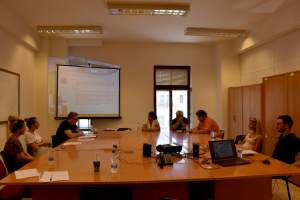 A focus group involving thirteen low-skilled adults took place in Patras, Greece, on June 6, 2018. The focus group took place at noon (12:00 – 14:00) at the Patras premises of the Hellenic Open University, a convenient location near the city centre. Four of participants were unemployed, four of them were employed, three were migrants, one elder – retired, and one student. Among them, there was also a person representing a rehabilitation and integration social enterprise. Eight out of the thirteen participants were women.
A focus group involving thirteen low-skilled adults took place in Patras, Greece, on June 6, 2018. The focus group took place at noon (12:00 – 14:00) at the Patras premises of the Hellenic Open University, a convenient location near the city centre. Four of participants were unemployed, four of them were employed, three were migrants, one elder – retired, and one student. Among them, there was also a person representing a rehabilitation and integration social enterprise. Eight out of the thirteen participants were women.
The focus group ran with the support of one facilitator (Nick Achilleopoulos) and one observer (Panagiota Zafeiropoulou) from Hellenic Open University. The facilitator presented the objectives of DCDS project and the purpose of the focus group. Additionally, he informed the participants about the focus group method and the ground rules. After that, the main discussion session was conducted, lasting approximately 90 minutes; in the following, the most important findings are summarized.
Most of the participants agreed that the digital transformation has helped a lot people who are already familiar with technology but has also created serious problems to people who are not. Usually, the capability of adults to use effectively and properly technologies increases together with their educational level, although elder people may display negative stance about having to learn to use digital technologies. Overall, the Greek society does not seem to be ready for the digital transformation.
Most of the focus group participants agreed that they understand technologies and use them mainly for acquiring knowledge, recreation and serving their daily needs. They would like to improve their digital competences mostly to serve their daily and professional needs. In general, low-skilled adults need to improve their basic skills, whereas middle and high-skilled adults should focus on specialization.
A common problem the participants face with digital and online services is the perception that they are consumed by technology, instead of them using it. Moreover, they 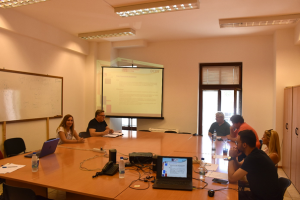 are afraid of their personal data being misused because they consider digital technologies as non-credible.
are afraid of their personal data being misused because they consider digital technologies as non-credible.
Most of the people participating to this focus group prefer distance learning, preferably with the support of a tutor. This type of learning should be accompanied with project works (assignments) and a pre-assessment of their skills related to the use of online learning platforms. The learning contents should be mostly interactive and include videos. People without previous experience in online learning were also excited with the idea of learning through videos and interactive materials. Migrants would like videos to come with subtitles in their mother tongue. Learning through online means should be based on easy-to-use platforms and supported by an online tutor.
Last, given that most employers acknowledge the value of certification, participants would like to receive a certificate at the end of training, to use it for professional purposes. Unfortunately, the social competences and most competences that are developed through experience, as well as prior experience, are not accredited.

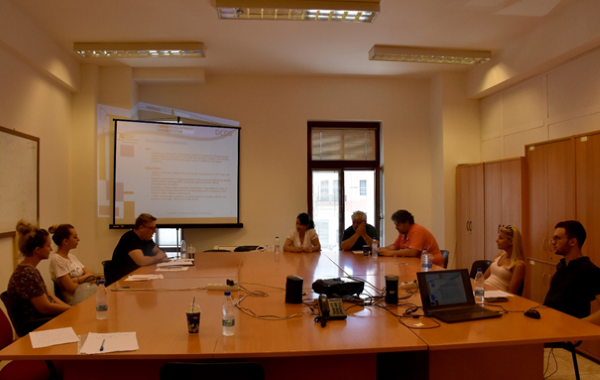
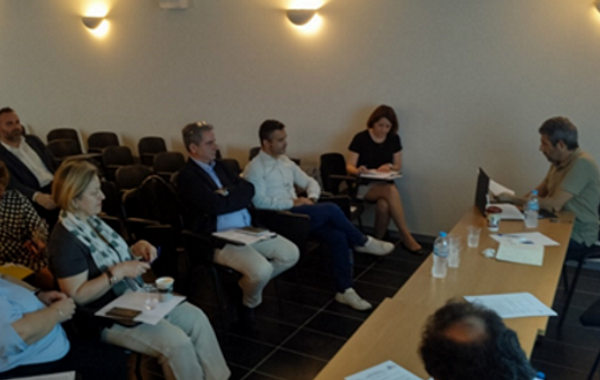
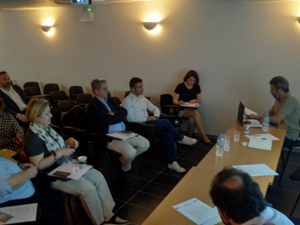 A focus group involving ten policy makers (mainly) and training providers took place in Athens, Greece, on May 3, 2018. The focus group took place in the afternoon (17:30 – 19:30) at the Athens’ Premises of the Hellenic Open University, a convenient location near the city centre. Eight of the participants were representatives of governmental bodies (including the Ministry of Employment, the Ministry of Administrative Reform, the Ministry of Digital Policy, Telecommunications and Media, the Ministry of Economy and Development, the National Centre for Social Research, the Hellenic Telecommunications and Post Commission, the General Secretariat of Coordination) and two were stakeholders from the Adult Learning market. Four out of the ten participants were women. The focus group lasted almost two hours and led to fruitful discussions between the participants.
A focus group involving ten policy makers (mainly) and training providers took place in Athens, Greece, on May 3, 2018. The focus group took place in the afternoon (17:30 – 19:30) at the Athens’ Premises of the Hellenic Open University, a convenient location near the city centre. Eight of the participants were representatives of governmental bodies (including the Ministry of Employment, the Ministry of Administrative Reform, the Ministry of Digital Policy, Telecommunications and Media, the Ministry of Economy and Development, the National Centre for Social Research, the Hellenic Telecommunications and Post Commission, the General Secretariat of Coordination) and two were stakeholders from the Adult Learning market. Four out of the ten participants were women. The focus group lasted almost two hours and led to fruitful discussions between the participants.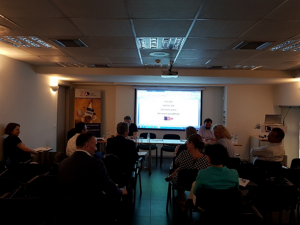 In general, the groups of the population that DCDS should target include people belonging to vulnerable groups (especially those culturally differentiated, e.g. Roma, people with disabilities, (recent and long-term) unemployed, people at risk of poverty, people with chronic disorders, immigrants and migrants, women, single parent families, etc), people aged 45+, unemployed (and especially recently unemployed), etc. An additional group identified includes the people working in high-level positions (e.g. CEOs, traditional media manager, elder academics, artists, judges, public servants, etc) who are ashamed to declare their lack of digital skills. It worth to mention that every attempt to “bridge the digital divide” should not be accomplished once, but should be repeated frequently on a regular basis, as digital skills require continuous updating and practical implementation.
In general, the groups of the population that DCDS should target include people belonging to vulnerable groups (especially those culturally differentiated, e.g. Roma, people with disabilities, (recent and long-term) unemployed, people at risk of poverty, people with chronic disorders, immigrants and migrants, women, single parent families, etc), people aged 45+, unemployed (and especially recently unemployed), etc. An additional group identified includes the people working in high-level positions (e.g. CEOs, traditional media manager, elder academics, artists, judges, public servants, etc) who are ashamed to declare their lack of digital skills. It worth to mention that every attempt to “bridge the digital divide” should not be accomplished once, but should be repeated frequently on a regular basis, as digital skills require continuous updating and practical implementation.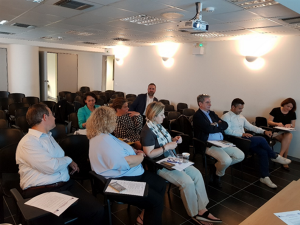 The establishment of a national strategy (including a “set of rules” for training, accreditation, etc) by the Ministry of Digital Policy that would create a common ground is required. In addition, a change in the Greek mindset is required, i.e. to change this latest tension of “computerising” everything and focus more on user (human) – friendly technologies. This priority should be included in every attempt of developing and adopting information system, including the self-assessment tools mentioned earlier. Apart from the “supply” side mentioned, this change in the mindset should also be implemented in the “demand” side, i.e. the users should recognize and adopt digital technologies in their daily work duties, without asking for additional motivations.
The establishment of a national strategy (including a “set of rules” for training, accreditation, etc) by the Ministry of Digital Policy that would create a common ground is required. In addition, a change in the Greek mindset is required, i.e. to change this latest tension of “computerising” everything and focus more on user (human) – friendly technologies. This priority should be included in every attempt of developing and adopting information system, including the self-assessment tools mentioned earlier. Apart from the “supply” side mentioned, this change in the mindset should also be implemented in the “demand” side, i.e. the users should recognize and adopt digital technologies in their daily work duties, without asking for additional motivations.